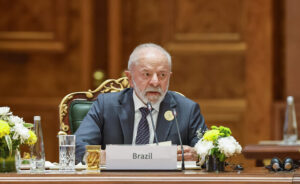
Published 09/23/2024 17:11 | Edited 09/23/2024 18:05
World leaders approved, last Sunday (22), during the Future Summit that is part of the 79th session of the UN General Assembly, the document Pact for the Futurewith 56 actions aimed at deepening international cooperation. The text approved by consensus by 143 countries, including Brazil, also includes the Global Digital Compact and the Declaration on Future Generations. Only seven countries were against it and 15 abstained.
For months, the Pact to rescue multilateralism, as made clear by UN Secretary-General António Guterres, has been negotiated. The entity classifies it as the “most comprehensive international agreement in many years” with issues in several areas, including energy transition, new technologies, the proposed reform of the Security Council, transformation of global governance, disarmament, countries’ debts, as well as actions to accelerate the implementation of the 2030 Agenda with the 17 Sustainable Development Goals (see the document, in English, in full here).
Among the points raised are measures for the energy transition with the end of the use of fossil fuels in a fair, orderly and equitable manner, as quickly as possible and progressively within this decade classified as critical in terms of climate change. The Pact also calls for an international instrument to address plastic pollution – something similar to the Nationally Determined Contribution (NDC) for the reduction of pollutant and greenhouse gas emissions.
Read more: At the Future Summit, Lula criticizes the lack of vitality, legitimacy and boldness at the UN
Regarding the reform of the UN Security Council, the text advocates “expanding the body to make it more representative” and addressing the underrepresentation of Africa, Asia-Pacific and South America. However, the text only introduces the idea of deepening dialogue when it comes to changing the veto power, both within the scope of the mechanism and in its use – the US has already shown its outright disagreement with any change in this regard.
Regarding the digital environment, the Nations committed to adopting “safe and secure open source software, open data, open artificial intelligence models and open standards that benefit society as a whole”. This is expected to lead to greater digital interoperability and more transparent processes in the use of Artificial Intelligence.
The request for a broad debate on disarmament was also approved, with a commitment to respect the treaties and protocols that aim to prevent a nuclear war.
In the context of countries’ financial crises, the Pact supports indebted countries in overcoming their expenses while prioritizing the Sustainable Development Goals.
No Pact for the Future There are also provisions for the protection of civilians in combat, the eradication of poverty, the elimination of hunger, gender equality, the promotion of culture and sport, the reform of the international financial architecture, among others.
Despite the broad approval, seven countries were against it: Belarus, North Korea, Iran, Nicaragua, Russia and Syria. They presented a proposed wording for one of the articles that stated that “the United Nations and its system shall not intervene in matters which are essentially within the domestic jurisdiction of any State”. The request to modify the text was rejected by the other countries.
The general debate of the 79th session of the UN General Assembly will take place next Tuesday (24). President Lula will give the opening speech, in an event historically held by Brazil.
Source: vermelho.org.br

